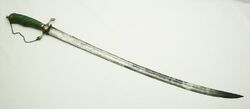| John Paul Jones' Sword | |
|---|---|

| |
| I have not yet begun to fight! | |
|
Origin |
John Paul Jones |
|
Type |
Sword |
|
Effects |
Inspires confidence in the words of whoever wields it, making people obey. |
|
Downsides |
Eventual insubordination |
|
Activation |
Holding/speaking |
|
Collected by |
|
|
Section |
|
|
Aisle |
4936-705 |
|
Shelf |
89236-2814-173 |
|
Date of Collection |
5/25/15 |
| [Source] | |
Origin[]
John Paul Jones (July 6, 1747 – July 18, 1792) was a Scottish American sailor and the United States' first well-known naval fighter in the American Revolutionary War. His actions in combat gained him a reputation as the "Father of the United States Navy". He was ally to many of the Founding Fathers, scourge to his crew and pirate of low regard to the British.
During his early sailing days, he was known to be harsh upon his crewmembers. One voyage, he flogged an adventurer who tried to mutiny and died from his injuries, resulting in his name being tainted in his native Scotland. A return trip saw him killing another subordinate, forcing Jones to flee from his fortunes to Virginia. He served under the Continental Navy performing transport, POW rescues and convoy escorts. Jones managed to anger the commodore and was re-assigned to work with Benjamin Franklin to receive sailing vessels from the French.
With ship in tow, he assaulted English shipping lanes and anchored in Carrickfergus, Ireland to further agitate the Royal Navy. Most of the crew were in personal reports described as rowdy, undisciplined. Jones tried to capture the local Earl of Selkirk in exchange for prisoner releases, but instead negotiated with the wife and butler. All the mates wanted to pillage and burn the town for prize money; Jones allowed them to take one silver plate only, which he later bought and returned to the Earl after the war.
In 1779, Captain Jones took command of the 42-gun USS Bonhomme Richard and engaged with the 50-gun British frigate HMS Serapis. Realizing the conditions were unfavorable to win, Jones instead stalemated by locking both ships in close combat. At some point the Richard crew assumed Jones had perished and wished to surrender to the Serapis. Jones responded with defiance and grenades - "I may sink, but I'll be damned if I strike (surrender)". An explosion in the Serapis effectively crippled both vessels and the British yielded. The Richard sank from damage and the Serapis was overtaken. King Louis XVI awarded him the title Chevalier and honorary sword, while the British snickered at him as a seafaring thug.
Effects[]
This sword, when wielded, inspires great confidence in the words of the user, allowing them to lead/control others who hear. It amplifies one's own belief in their ability into unwavering decisiveness. Many who hear the tersest saying to focus and fight onwards will be spurred into action. Requires continual vocal reinforcement every half hour or so to continue working, requiring a new motivating rally each time. Those who fail to uplift their subordinates will see those very same people betray and desert them, as Jones had trouble maintaining himself with his own officers and fellow commanders.
